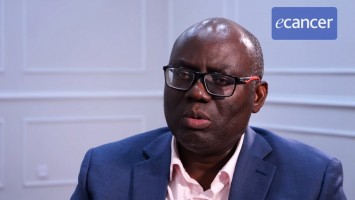A super-fast, cloud-based, AI imaging system for radiotherapy
Mahmudul Hasan - CEO MVision AI, Helsinki, Finland
We have a very revolutionary product that’s a software as a service company in the cloud. It also takes the power of deep learning based AI and doing the automatic segmentation and saving time for clinicians. So our product is now in clinical use in the last three months and this is now revolutionising how the treatment is delivered. In one hospital the prostate patients now get the scan and the treatment delivery on the same day. Typically that takes six, sometimes eight, weeks.
How accurate is this?
We follow international guidelines and then when we provide this these are as a draft anyway. So in our validation it proves that only below 2.5% needed to be significantly modified. This is just a first version of this product – we believe within the next 18 months to two years down the line it will outperform any human.
Can it be implemented in low-middle income countries?
This is actually our mission of our company to actually take a deep learning model that has learned from advanced countries and deploy that model for the developing countries where there is limited access to clinical resources. It is like having… I clearly remember when the mobile phones came and actually revolutionised the internet access. We believe it’s a similar kind of transition where we bring the power of AI to the developing countries for a faster, better and cheaper treatment for cancer with radiotherapy.
How can we teach people how to use this?
Absolutely, education is very important. Since the rise of AI the work of the clinicians fundamentally is going to change. So it is how to actually work alongside with the AI for a better clinical outcome so that would need a joint collaboration between the AI side of it and the clinicians. So it’s absolutely important when we do the curriculum or the education for the clinicians also to embed that what AI can bring and how AI and the human clinicians can work together for a better outcome.
Is there anything you’d like to add?
Our mission is to bring this AI to whoever needs this and that doesn’t have to be developing countries. Even in the developed countries it is needed. There is a Guardian article that in the United Kingdom there are 20,000 patients in any given month waiting for care. So it is not just a problem of the developing countries, it’s also a problem for a developed country like the UK.
How will you make this available everywhere?
Because the power of the cloud, the connectivity and the power that it brings also for close collaboration, that’s really super-important. One of the ideas, for example, that we’re exploring in Finland that some centres, even though they have all the expensive equipment, due to lack of clinical resources they are not able to treat certain cancers. With this connected cloud approach where the clinicians are based in wherever they’re based in but the patient is near the centre so the patient does not have to travel further to get a better treatment. So that is something we’re extremely excited about and that is the power that cloud and AI brings to the table.








